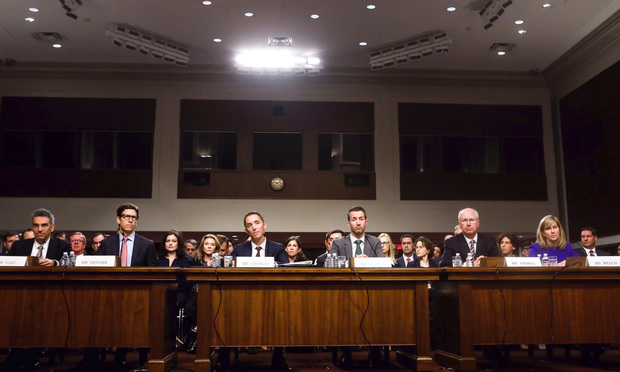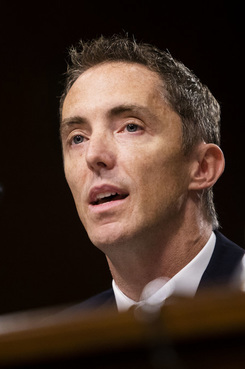An American GDPR? Companies' Privacy Gurus Discuss Future Federal Data Law in DC
Privacy experts from Google, Twitter, AT&T and other companies gathered on Capitol Hill today to talk about what a federal privacy law would look like.
September 26, 2018 at 03:57 PM
5 minute read
 Pictured, from left, are Len Cali, senior vice president of global public policy with AT&T Inc., Andrew DeVore, vice president and associate general counsel with Amazon.com Inc., Keith Enright, chief privacy officer with Google, Damien Kieran, global data protection officer and associate legal director with Twitter Inc., Guy “Bud” Tribble, vice president for software technology with Apple Inc., and Rachel Welch, senior vice president of policy and external affairs with Charter Communications Inc., testify during a Senate Committee on Commerce, Science, and Transportation hearing regarding potential safeguards for consumer data privacy, on Sept. 26. Photo Credit: Diego Radzinschi/ALM
Pictured, from left, are Len Cali, senior vice president of global public policy with AT&T Inc., Andrew DeVore, vice president and associate general counsel with Amazon.com Inc., Keith Enright, chief privacy officer with Google, Damien Kieran, global data protection officer and associate legal director with Twitter Inc., Guy “Bud” Tribble, vice president for software technology with Apple Inc., and Rachel Welch, senior vice president of policy and external affairs with Charter Communications Inc., testify during a Senate Committee on Commerce, Science, and Transportation hearing regarding potential safeguards for consumer data privacy, on Sept. 26. Photo Credit: Diego Radzinschi/ALM
In the wake of the European Union's General Data Protection Regulations—which went into effect in May—California passed its own data privacy law, sparking a national conversation about privacy regulation.
On Wednesday, that discussion headed to Washington, D.C. At a hearing by the Senate Committee on Commerce, Science and Transportation, representatives from communications and tech companies including Google and Twitter Inc., pushed for their vision of federal privacy regulation.
“Perhaps for the first time, there is widespread agreement among industry, policy makers and many consumer groups of the need for a new and comprehensive federal privacy law,” said AT&T Inc.'s representative, senior vice president Len Cali in his opening testimony. He and other representatives said a patchwork state-by-state regulatory framework would only harm consumers and businesses.
But some senators said the push for federal regulations could be companies' way of avoiding strict data privacy laws like the California Consumer Privacy Act, as those would be pre-empted by a potentially more relaxed national law.
“The companies which are represented here today and all across the country are ultimately going to want California law pre-empted and they're going to want other states' laws pre-empted,” Sen. Ed Markey of Massachusetts said. “They're going to ask this panel to do that. So our goal has to be to ensure that any law which we pass out of this committee is a strong law. We don't need to pass weak laws in Washington that override strong laws in California or Massachusetts or other states.”
Companies' representatives gave their input for what a federal privacy law could look like, based their experiences with GDPR and the CCPA.
Cali, alongside Apple's vice president for software technology Guy Tribble and Google's chief privacy officer Keith Enright, expressed concerns that the resources necessary to comply with regulations as strict as GDPR were so great they could push small- and medium-sized competitors out of the industry.
 Keith Enright.
Keith Enright.Enright told the committee that Google's preparations for GDPR had taken “hundreds of years of human time,” time smaller companies may not have to spare. Damien Kieran, the data protection officer at Twitter, said his company also struggled with the burden of heavy data privacy regulation.
“Organizations like Google are better positioned to absorb the compliance costs that a rigorous regulatory regime like that under the GDPR could create for small- and medium-sized businesses,” Enright said.
Enright and Amazon.com Inc. vice president and associate general counsel Andrew DeVore also expressed a desire for a clearer definition of personal information than those presented in the GDPR or the CCPA.
“CCPA's definition of 'personal information' goes beyond information that actually identifies a person to include any information that 'could be linked with a person,' which arguably is all information. The result is a law that is not only confusing and difficult to comply with, but that may actually undermine important privacy-protective practices like encouraging companies to handle data in a way that is not directly linked to a consumer's identity,” DeVore said in his testimony.
Charter Communications Inc.'s representative, senior vice president of policy and external affairs Rachel Welch, suggested “opt in” data collection and use become the standard.
Some senators also took Enright's presence as an opportunity to inquire about reports that Google is developing a censored search engine for China, the company's withdrawal from Project Maven and claims of political biases in its search engine.
Enright said the company is “not close” to launching a search engine in China. In response to questions from Sen. Ted Cruz of Texas, Enright said he is unaware of Google efforts to assess political biases in search results.
But, he said, “We're stepping outside of my core domain.”
Last month, Google irked senators on both sides of the aisle after leaving a chair empty for a Senate Intelligence Committee hearing on social media and foreign election interference. The Mountain View, California-based company had offered chief legal officer Kent Walker, who was rejected by the committee.
This content has been archived. It is available through our partners, LexisNexis® and Bloomberg Law.
To view this content, please continue to their sites.
Not a Lexis Subscriber?
Subscribe Now
Not a Bloomberg Law Subscriber?
Subscribe Now
NOT FOR REPRINT
© 2025 ALM Global, LLC, All Rights Reserved. Request academic re-use from www.copyright.com. All other uses, submit a request to [email protected]. For more information visit Asset & Logo Licensing.
You Might Like
View All
How Marsh McLennan's Small But Mighty Legal Innovation Team Builds Solutions That Bring Joy

Aggressive FTC May Force Merging Companies to Bolster Legal Defenses
4 minute read
Best Legal Departments: How Blackstone's Legal and Compliance Team Got the All-Clear to Grow Business

CEOs Want Data-Based Risk Management; GCs Lack the Tech to Do So.
Trending Stories
- 1Critical Mass With Law.com’s Amanda Bronstad: LA Judge Orders Edison to Preserve Wildfire Evidence, Is Kline & Specter Fight With Thomas Bosworth Finally Over?
- 2What Businesses Need to Know About Anticipated FTC Leadership Changes
- 3Federal Court Considers Blurry Lines Between Artist's Consultant and Business Manager
- 4US Judge Cannon Blocks DOJ From Releasing Final Report in Trump Documents Probe
- 5White & Case KOs Claims Against Voltage Inc. in Solar Companies' Trade Dispute
Who Got The Work
J. Brugh Lower of Gibbons has entered an appearance for industrial equipment supplier Devco Corporation in a pending trademark infringement lawsuit. The suit, accusing the defendant of selling knock-off Graco products, was filed Dec. 18 in New Jersey District Court by Rivkin Radler on behalf of Graco Inc. and Graco Minnesota. The case, assigned to U.S. District Judge Zahid N. Quraishi, is 3:24-cv-11294, Graco Inc. et al v. Devco Corporation.
Who Got The Work
Rebecca Maller-Stein and Kent A. Yalowitz of Arnold & Porter Kaye Scholer have entered their appearances for Hanaco Venture Capital and its executives, Lior Prosor and David Frankel, in a pending securities lawsuit. The action, filed on Dec. 24 in New York Southern District Court by Zell, Aron & Co. on behalf of Goldeneye Advisors, accuses the defendants of negligently and fraudulently managing the plaintiff's $1 million investment. The case, assigned to U.S. District Judge Vernon S. Broderick, is 1:24-cv-09918, Goldeneye Advisors, LLC v. Hanaco Venture Capital, Ltd. et al.
Who Got The Work
Attorneys from A&O Shearman has stepped in as defense counsel for Toronto-Dominion Bank and other defendants in a pending securities class action. The suit, filed Dec. 11 in New York Southern District Court by Bleichmar Fonti & Auld, accuses the defendants of concealing the bank's 'pervasive' deficiencies in regards to its compliance with the Bank Secrecy Act and the quality of its anti-money laundering controls. The case, assigned to U.S. District Judge Arun Subramanian, is 1:24-cv-09445, Gonzalez v. The Toronto-Dominion Bank et al.
Who Got The Work
Crown Castle International, a Pennsylvania company providing shared communications infrastructure, has turned to Luke D. Wolf of Gordon Rees Scully Mansukhani to fend off a pending breach-of-contract lawsuit. The court action, filed Nov. 25 in Michigan Eastern District Court by Hooper Hathaway PC on behalf of The Town Residences LLC, accuses Crown Castle of failing to transfer approximately $30,000 in utility payments from T-Mobile in breach of a roof-top lease and assignment agreement. The case, assigned to U.S. District Judge Susan K. Declercq, is 2:24-cv-13131, The Town Residences LLC v. T-Mobile US, Inc. et al.
Who Got The Work
Wilfred P. Coronato and Daniel M. Schwartz of McCarter & English have stepped in as defense counsel to Electrolux Home Products Inc. in a pending product liability lawsuit. The court action, filed Nov. 26 in New York Eastern District Court by Poulos Lopiccolo PC and Nagel Rice LLP on behalf of David Stern, alleges that the defendant's refrigerators’ drawers and shelving repeatedly break and fall apart within months after purchase. The case, assigned to U.S. District Judge Joan M. Azrack, is 2:24-cv-08204, Stern v. Electrolux Home Products, Inc.
Featured Firms
Law Offices of Gary Martin Hays & Associates, P.C.
(470) 294-1674
Law Offices of Mark E. Salomone
(857) 444-6468
Smith & Hassler
(713) 739-1250






